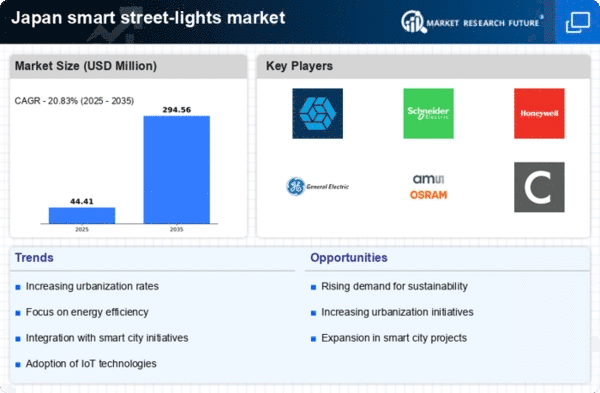Environmental Sustainability Goals
The increasing emphasis on environmental sustainability in Japan significantly impacts the smart street-lights market. As the nation aims to achieve carbon neutrality by 2050, the adoption of energy-efficient lighting solutions becomes paramount. Smart street-lights, which utilize LED technology and renewable energy sources, align with these sustainability goals. In 2025, it is projected that the market for smart street-lights will witness a growth rate of 20% as municipalities seek to reduce their carbon footprints. Additionally, the ability to integrate solar panels into smart street-lights further enhances their appeal, allowing for self-sustaining energy solutions. This focus on environmental sustainability not only drives the demand for smart street-lights but also positions them as essential components in Japan's broader strategy to combat climate change.
Government Initiatives and Funding
The Japanese government actively promotes the adoption of smart street-lights through various initiatives and funding programs. With a focus on enhancing urban infrastructure, the government allocates substantial budgets to support the deployment of smart street-lights. In 2025, it is estimated that public sector investments in smart city technologies, including smart street-lights, could reach approximately $1 billion. This financial backing not only facilitates the installation of advanced lighting systems but also encourages local municipalities to adopt innovative solutions. The smart street-lights market in Japan benefits from these initiatives, as they align with national goals for energy efficiency and sustainability. Furthermore, the government's commitment to reducing carbon emissions by 46% by 2030 further propels the demand for smart street-lights, which are integral to achieving these environmental targets.
Urbanization and Population Growth
Japan's ongoing urbanization and population growth are pivotal drivers of the smart street-lights market. As urban areas expand, the demand for efficient and sustainable lighting solutions becomes increasingly critical. By 2025, it is anticipated that over 90% of Japan's population will reside in urban centers, necessitating the implementation of smart street-lights to manage energy consumption effectively. These systems not only provide adequate illumination but also contribute to the overall aesthetic and safety of urban environments. The smart street-lights market is likely to see a surge in demand as cities strive to accommodate growing populations while minimizing their environmental impact. Furthermore, the integration of smart technologies in urban planning aligns with Japan's vision of creating smart cities, thereby enhancing the appeal of smart street-lights as a viable solution.
Technological Advancements in Lighting
Rapid technological advancements in lighting solutions significantly influence the smart street-lights market in Japan. The integration of LED technology has revolutionized street lighting, offering energy-efficient alternatives to traditional systems. LEDs consume up to 75% less energy and have a lifespan of over 25,000 hours, making them a preferred choice for municipalities. Additionally, the incorporation of IoT (Internet of Things) capabilities allows for real-time monitoring and control of street-lights, enhancing operational efficiency. As of 2025, it is projected that the market for smart street-lights will grow at a CAGR of 15%, driven by these technological innovations. The ability to remotely manage lighting systems not only reduces maintenance costs but also improves public safety by ensuring well-lit streets. Thus, technological advancements play a crucial role in shaping the smart street-lights market in Japan.
Public Awareness and Demand for Smart Solutions
There is a growing public awareness and demand for smart solutions in Japan, which is a significant driver for the smart street-lights market. As citizens become more informed about the benefits of smart technologies, including enhanced safety and energy efficiency, municipalities are compelled to respond to these expectations. Surveys indicate that approximately 70% of urban residents support the implementation of smart street-lights, recognizing their potential to improve public safety and reduce energy costs. This shift in public sentiment encourages local governments to invest in smart street-lights, as they seek to meet the demands of their constituents. By 2025, it is expected that the smart street-lights market will expand as more cities adopt these technologies to enhance urban living conditions and address community concerns.















